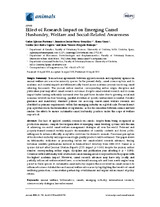Effect of Research Impact on Emerging Camel Husbandry, Welfare and Social-Related Awareness
Autor
Iglesias Pastrana, Carlos
Navas González, Francisco Javier
Ciani, Elena
Barba Capote, C.J.
Delgado-Bermejo, J.V.
Editor
MDPIFecha
2020Materia
Animal welfareBibliometrics
Camels
Emerging industry
International research
Science–society dialogue
Law enforcement
METS:
Mostrar el registro METSPREMIS:
Mostrar el registro PREMISMetadatos
Mostrar el registro completo del ítemResumen
The lack of applied scientific research on camels, despite them being recognized as production animals, compels the reorganization of emerging camel breeding systems with the aim of achieving successful camel welfare management strategies all over the world. Relevant and properly-framed research widely impacts dissemination of scientific contents and drives public willingness to enhance ethically acceptable conditions for domestic animals. Consumer perception of this livestock industry will improve and high-quality products will be obtained. This paper draws on bibliometric indicators as promoting factors for camel-related research advances, tracing historical scientific publications indexed in ScienceDirect directory from 1880–2019. Camel as a species did not affect Journal Citation Reports (JCR) impact (p > 0.05) despite the journal, author number, corresponding author origin, discipline and publication year affecting it (p < 0.001). Countries with traditionally well-established camel farming are also responsible for the papers with the highest academic impact. However, camel research advances may have only locally and partially influenced welfare related laws, so intentional harming acts and basic needs neglect may persist in these species. A sustainable camel industry requires those involved in camel research to influence business stakeholders and animal welfare advocacies by highlighting the benefits of camel wellbeing promotion, co-innovation partnership establishment and urgent enhancement of policy reform.

